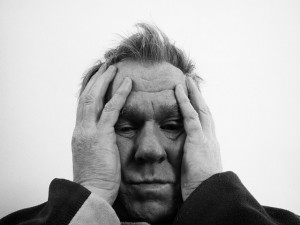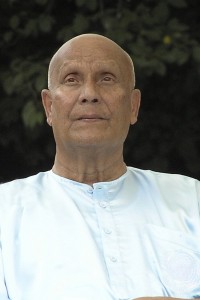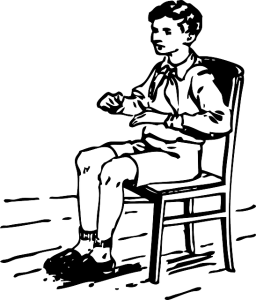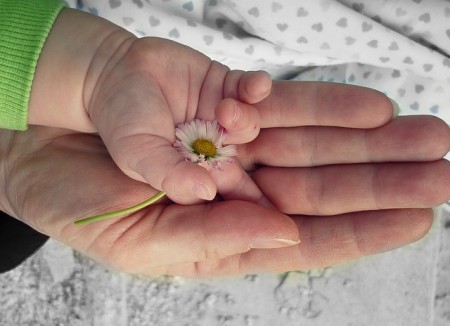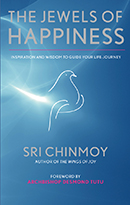Every day there is only
One thing to learn:
How to be honestly happy.
How my daily practice of meditation helped me to conquer depression
In the beginning phase of my spiritual life for some time I suffered from a discouraging bout of depression. It often felt as if a giant stone had firmly planted itself in my stomach and quelled every hopeful streak that entered into me. Life felt like an endless black night without hope or purpose. Although I had never been prone to depression before and could look back on a happy, cheerful childhood, I often felt like I would never be truly happy again.
Drowning Man
Although my world seemed steeped in darkness during the time of my depression, I did meditate every day. I didn’t really feel that much was happening during those quiet sessions in front of my meditation shrine, but I was wrong.
One day I suddenly became aware of a little light going out from my heart. It was ever so tiny, but I decided to concentrate on it and did not let go. The little light felt to me like a lifeline, which I grabbed with both hands like the drowning man I felt myself to be.
Much to my surprise the light remained with me and I discovered I could muster it at will. It gave me a light and happy feeling inside. Whenever I focused on it, a little engine started humming inside me, working some unseen inner magic and clearing up the dark clouds that had been hovering around me for the past few months.
I finally understood what my teacher Sri Chinmoy meant when he spoke about ‘aspiration’, an inner flame or cry that climbs up and illumines everything around us. This little light in my heart must be aspiration, I thought.
Unlimited Power
Imagine my profound joy and gratitude when after about three days my depression had completely disappeared. I couldn’t believe it! And when those dark clouds cleared a powerful inner sun rose within me, filling me with a deep sense of peace, happiness, love and joy. I felt like I had woken up from a bad dream only to find myself in another dream – this one sweet, beautiful and full of happiness.
This episode proved to me that meditation has unlimited power to conquer all negative qualities in life. When you suffer from depression everything seems hopeless. It’s one of the hardest negative qualities to get rid of, since it saps the very essence of the life-force. But regular meditation brings in light – first a trickle, then a few beams, then a steady flow – and with patience and faith this light will eventually illumine the darkness.
Practice regularly, have faith and be triumphant.

Writings on humanity in the midst of war – by Walt Whitman
Walt Whitman, perhaps the famous American poet of the 19th century, spent much of the Civil war visiting hospitals containing the wounded, talking with the soldiers and cheering them up as best he could. His notes were later published in the book Specimen Days (1882). Whitman does not flinch from describing the horrors of the war, but there are also many passages, a few of which we would like to share below, which shows the enduring human spirit even in the worst of times.
In my visits to the hospitals I found that it was in the simple matter of personal presence, and emanating ordinary cheer and magnetism, that I succeeded and help’d more than by medical nursing, or delicacies, or gifts of money, or anything else.
On seeing Abraham Lincoln: I see the President every day, as I happen to live where he passes to or from his lodgings out of town…ee have got so we exchange bows, and very cordial ones…they pass’d me once very close, and I saw the President in his face fully, as they were moving slowly, and his look, though abstracted, happen’d to be directed steadily in my eye. Ho bow’d and smiled, but far beneath his smile I have noted the expression I have alluded to. None of the artist and pictures have fought the deep, though subtle and indirect expression on the man’s face. There is something else there. One of the great portrait painters of two or three centuries ago is needed.
On hospital visits: Each case has its peculiarities and needs some new adaptation. I have learnt to conform – learnt a good deal of hospital wisdom. Some of the poor young chaps, away from home for the first time in their lives, hunger and thirst for affection; this is sometimes the only thing that will reach their condition…I have come to adapt to each emergency, after its kind or call, however trivial, however solemn, every one justified and made real under its circumstances – not only visits and cheering talk and little gifts – not only washing and dressing wounds (I have in some cases where the patient is unwilling anyone should do this but me) – but passages from the Bible, expounding them, prayer at the bedside, explanations of doctoring (I think I see my friends smiling at this confession, but I was never more earnest in my life ((Whitman was generally skeptical of churches and organised religion, but have a very strong personal spirituality and belief that all faiths were equally true)) )
 This afternoon, July 22nd, I have spent a long time with Oscar F. Wilber, Company G, 154th New York..he asked me to read him a chapter in the New Testament..it pleased him very much, yet the tears were in his eyes. He ask’d me if I enjoy’d religion. I said “Perhaps not, my dear, in the way you mean, and yet, maybe, it is the same thing.”
This afternoon, July 22nd, I have spent a long time with Oscar F. Wilber, Company G, 154th New York..he asked me to read him a chapter in the New Testament..it pleased him very much, yet the tears were in his eyes. He ask’d me if I enjoy’d religion. I said “Perhaps not, my dear, in the way you mean, and yet, maybe, it is the same thing.”
Every now and then, in hospital or camp, there are beings I meet – specimens of unworldliness, disinterestness, and animal purity and heroism…on whose birth the calmness of heaven seems to have descended, and on whose gradual growing up…the power of a strange spiritual sweetness, fibre and inward health, have also attended. Something veil’d and abstracted is often a part of the manners of these beings. I have met them, I say, not seldom, in the army, in camp, and in hospitals. The Western regiments contain many of them. They are often young men, obeying the events and occasions about them…unaware of their own nature (as to that, who is aware of his own nature?) their companions only understanding that they are different from the rest, more silent, “something odd a bout them” and apt to of off and meditate and muse in solitude.
 On the generosity of the American people: As a very large proportion of the wounded came up from the front without a cent of money in their pockets, I soon discover’d that it was about the best thing I could do to raise their spirits, and show them that somebody cared for them, and practically felt a fatherly or brotherly interest in them, to give them small sums in such cases, using tract and discretion about it. I am regularly supplied in this purpose by good women and men in Bostom, Salem, Providence, Brroklyn and New York…I learn’d one thing conclusively – that beneath all the ostensible greed and heartlessness of our times there is no end to the generous benevolence of the men and women in the United States , when they are sure of their object. Another thing became clear to me – while cash is not amiss to bring up the rear, tact and magnetic sympathy and unction are, and ever will be, sovereign still.
On the generosity of the American people: As a very large proportion of the wounded came up from the front without a cent of money in their pockets, I soon discover’d that it was about the best thing I could do to raise their spirits, and show them that somebody cared for them, and practically felt a fatherly or brotherly interest in them, to give them small sums in such cases, using tract and discretion about it. I am regularly supplied in this purpose by good women and men in Bostom, Salem, Providence, Brroklyn and New York…I learn’d one thing conclusively – that beneath all the ostensible greed and heartlessness of our times there is no end to the generous benevolence of the men and women in the United States , when they are sure of their object. Another thing became clear to me – while cash is not amiss to bring up the rear, tact and magnetic sympathy and unction are, and ever will be, sovereign still.

How to handle those jobs you just don’t want to do
Each time I look at my desk my conscience rumbles and a quiet sigh passes my lips. I know it needs some serious cleaning and tidying up, but I just don’t feel like it. Besides, what’s the use of putting in all those tedious minutes if after two days all the order has fallen back into chaos again? I know it’s just my lazy mind speaking and that I always feel much better when my desk is neat and tidy, but I guess not doing what one is supposed to do is just one of those perks of being human.
And I know I’m not alone here. A stack of piled-up dishes, a dusty attic full of old rubbish or a shed badly in need of paint are familiar sights to many a household. They are the silent reminders of our fun-loving, duty-eschewing nature. And let’s face it, it’s not the end of the world to have, say, an unkempt garden. But on the other hand, wouldn’t it be great if we could take all the loathing out and do the things we simply have to do with joy and enthusiasm? Yes, you can have a clean desk and a beautiful garden every day. Here’s three different approaches to getting those tedious jobs done:
1. The Mary Poppins Approach
Don’t hate it, love it! Instead of wallowing in a sense of dread, try to convince yourself the job at hand is actually fun. Mary Poppins was a master of this art. “In every job that must be done there is an element of fun,” she cheerfully exclaimed. Often that sense of dread exists only in our head (I know it sounds like another Mary Poppins slogan, but this one is actually mine), so we just have to tell ourselves it is something we enjoy doing. The trick is to really believe it. So think ‘fun, fun, fun’ and throw yourself heart and soul into the activity. You may find it will really be enjoyable, or at least not the ordeal you thought it to be. And before you know it, it’s all done! In Mary Poppins’ words: “Every job you undertake, becomes a piece of cake.”
2. The Zen Approach
One reason why we don’t like doing certain things is that we are all the time thinking of all the things we might be doing instead. According to our mind the grass is always greener in the neighbour’s garden. So when we are cleaning the house, we think about watching TV and when we are watching TV we think about cleaning the house. A famous zen proverb says, ‘When walking, walk. When eating, eat.’ Try this approach for all those so-called tedious jobs. When you clean the house, try to think only of cleaning the house (likewise, when you are watching TV, really enjoy watching TV!). Whatever it is you are doing, do it with your full attention and focus. Feel the dishwater on your hands, be conscious of the texture of the pots and pans and focus fully on the rubbing of the dish brush. Your work itself will become a meditation. To your wide surprise, at the end you will feel energized and refreshed, instead of numbed and dulled.
3. The Old-Fashioned Approach
If all else fails, and you can’t turn that little switch in your mind, try the approach your mother used on you when you were still a kid. ‘You can watch TV only after you do your homework,’ she used to tell you. Even though doing homework never really became fun, at least it was done, and you could watch the A-Team. Why not employ that tried and tested method again? Be your own parent and sternly tell yourself that only if you mow the lawn/clean the aquarium/walk the dog, you’ve earned yourself an hour TV time/a piece of cheesecake/a new pair of shoes. Ideally the reward should match up to the tediousness of the task, so be prepared to clean quite a few aquariums for that new pair of shoes.

Meaning vs Happiness
If you had to choose between a meaningful life or a happy life, which would you rather have? Probably you would want both, but researchers from the universities of Stanford, Minnesota and Florida State found that although happiness and meaningfulness greatly overlap, there are also distinct differences. One can have an unhappy but meaningful life, full of struggles and challenges. And the opposite is also true: one can have a happy, yet totally superficial life without much meaning in it.
In the study the psychologists asked 400 subjects to fill out a questionnaire on happiness and meaningfulness. The scientists found that happiness was often related to taking, whereas meaning was strongly tied to giving. They also discovered that being in the moment and focusing on the here and now generated happiness. Alternatively, thinking of the past and the future decreased happiness since it tends to make people feel stressed and worried, but it also increased meaningfulness because “recognizing links from the present to past and future would be helpful for success at meaningful enterprises, including education, career, and long-lasting intimate relationships,” the scientists wrote.
Another difference between happiness and meaning had to do with relationships, especially the nature of the relationship. It was generally found that having a social network contributes both to happiness and meaningfulness, but where spending time with loved ones scored high on meaning and lower on happiness, spending time with friends had the opposite result: a lower sense of meaning but plenty of happiness. The scientists think this has to do with the fact that in our relationship with our family members we more often face challenges and deal with problems, whereas with friends we’re not so deeply involved and are just out to have a good time.
Another interesting find in the study was that people will often sacrifice happiness for meaning. Occupations such as nursing, social work or activism tend to score high on meaningfulness but low on happiness. Still, they attract many people who value meaning more than just feeling good.
This finding also solves the famous ‘parenthood paradox’ or why people want to have children, even though being a parent has been shown to bring in more life-stress and reduce happiness. The answer is that people don’t become parents because they are seeking happiness, but because they seek meaning.
The psychologists conclude that meaningfulness is often overlooked, but should not be underestimated as a very powerful driver of human behavior. And it is just as important in life as happiness. “People have strong inner desires that shape their lives with purpose and focus – qualities that ultimately make for a uniquely human experience,” said psychologist Jennifer Aaker, one of the contributors to the study. Happiness alone, in the sense of pleasure seeking or sense gratification, is not enough for a truly fulfilling life.
On the contrary, another study by Aaker showed that in order to be really happy it’s better to focus on meaning than on happiness. In the study subjects were divided into two groups. The first group was asked to create happiness in the next 24 hours, whereas the second group was asked to create meaningfulness. After 24 hours the subjects in the second group were significantly happier than those who had just tried to create happiness. So while you can create happiness by focusing on meaning, the opposite does not hold true. Merely focusing on making yourself happy does not add meaning to life.
Ultimately a life that is both happy and meaningful would be the ideal. But sometimes it is more meaningful (!) to sacrifice a little outer happiness for some unseen inner meaning. Meaning creates depth and richness to our life. Happiness is the icing on the cake.

Book Review: Many Lives, Many Masters
“Through our meditation we first learn to deal with the results of our past lives. Then, eventually, we eliminate these results. Meditate well; go deep within. Ultimately you will be able to see with your third eye. When your third eye is opened up, you can destroy your past karma. It is through vision and through sincere effort that one can nullify his past.”
– Sri Chinmoy ((Sri Chinmoy, The Soul’s Evolution, New York: Agni Press, 1976. The book was reprinted in 1999 by Perfection-Glory-Press, Augsburg Germany. The passage quoted is on page 15 of the Augsberg edition.))
Of course, one would naturally expect that a spiritual Master like Sri Chinmoy, who grew up in a Hindu background, would say that we have past lives. He also says that these lives influence our present life; that we can learn to deal with this influence; and that we can eventually nullify the karma that we have accumulated in past lives. But what would a modern-day psychiatrist have to say about past lives and karma?
In Many Lives, Many Masters Dr. Brian Weiss answers this question. This is an important, moving and well-written book. It describes the author’s experiences in treating a patient who came to see him with deeply disturbing fears.
“Catherine,” a woman in her late twenties, who is attractive but seriously handicapped by fears of the dark, of choking, of water, and of many other things, comes to see Dr. Weiss. He is the head of the Department of Psychiatry in a university-affiliated hospital in the United States. The time is the early 1980s. Catherine, who works in the hospital as a lab technician, has been referred to this particular psychiatrist by two doctors on the hospital staff. Both have noticed how distressed and unhappy Catherine has appeared in recent months, and both feel that Dr. Weiss will be able to help her. He treats her with conventional talk-therapy for a year and a half. Although she is cooperative and intelligent, she fails to make any progress.
Because she has difficulty in remembering her childhood years, the psychiatrist decides to try hypnotherapy in order to uncover memories which may be important to her illness, but are repressed. In the first session, Catherine remembers a traumatic experience that happened when she was three years old. It seems that that might be the key, but when she returns the following week, her fears have not decreased.
In the second hypnotherapy session, the doctor instructs her to go back to the time when her symptoms started. Catherine, who believes in the Catholicism of her upbringing, starts to talk as if she were another person altogether, one who lived in a time much earlier than our own. She speaks as if she were this other person, and then comes to her death by drowning. After this single session, Catherine’s fear of water disappears, and she starts to look more relaxed. The psychiatrist, who does not believe in reincarnation, is quite surprised by what has happened. He is inclined to be very skeptical, but cannot deny the clinical evidence of Catherine’s relief, and so he continues the sessions.
In the course of these further hypnotherapy sessions, Catherine experiences, and speaks from within the lives of, several other past lifetimes. In each of the lives to which she returned, she suffered deep injuries or death. All are quite directly related to her present-day fears.
This almost sounds more like fiction than reality. The doctor, like the reader, wonders whether Catherine is somehow making up stories, or has some psychiatric condition, like “split personality,” that would account for what she has told him. However, because of his training, he is able to rule out any condition like that. Besides, her fears continue to diminish and then disappear. She is also visibly happier. She continues to eat in the hospital cafeteria where she had always taken her meals; but now, people often come to her, asking to join her, or saying they just wanted to tell her how beautiful she looks. She also starts to develop, or reveal, psychic powers, taking her father to the race-track and correctly predicting which horse will win each race.
During her sessions, when Catherine comes to the end of a past lifetime, she often enters a resting state, in which she speaks in a different tone of voice from either her everyday self or her past-lives selves. The content, also, is different from what she is usually interested in talking about. A lot of these messages have a spiritual aspect. The doctor thinks that she seems to be channeling information that she receives from wise spirits, or Masters. He becomes more and more convinced that what she is saying is of real value. One turning point comes for him when, in one of her resting states, she starts telling him things about his dead father, and his son who died when less than a month old. Very few people, and certainly none of his patients, knew anything about these matters.
As time goes on, the doctor starts to change as much as the patient. He comes to accept the reality of reincarnation. He thinks that, if we have had many lives in the past, and will have many more in the future, then there is no need to regard death in our current lifetime as the end; it is just one part of a very long journey. He thinks many people would find this helpful, as fear of death is so pervasive here in the West. He finds himself becoming more relaxed and less rigid when he is at home with his family, dropping some of the over-seriousness that had been one of his lifelong characteristics, and becoming more able to trust his intuition when he is treating patients. He starts to meditate, taking himself somewhat by surprise.
Even though I believed in reincarnation before, I must say that reading this book made the idea of past lives much more real to me. The day I finished it, I was riding on the subway from Queens to Manhattan, looking at my fellow passengers, and thinking with affection that each of us had existed in many different places and times before now. When I returned home later that day, I found that someone had removed a lovely new candy-tuft plant that I had bought from the plant nursery and planted just two days earlier. I was a little sad, but not unduly upset. I said to my roommate, “I guess it’s a pretty small tragedy in the larger scheme of things.” She looked surprised and laughed.
A lot of people have already found this book valuable, and many who have not yet read it will also. I know this review will not convince die-hard doubters of the existence of the soul or of reincarnation. I can hear some of my former scientific colleagues saying, “Probably Brian Weiss is the one who made all this up!” Personally, I don’t think the man flipped out. He says he waited a few years, after his treatment of Catherine, before he wrote it. He was afraid that his scientific colleagues would be doubtful about his veracity or his sanity. However, they did not fire him, so I guess he continued to do his job well. To me, the book has the ring of truth.

Self-Transcendence: an eyewitness view
Once we master the art
Of going beyond ourselves,
Nothing any longer
Can create any problem.
Indeed, this is a supreme discovery.–Sri Chinmoy ((Sri Chinmoy, Ten Thousand Flower-Flames, Part 12, # 1152, New York: Agni Press, 1981))
Ultra-running is one way of “going beyond ourselves.” In the last two weeks I have seen how happy people are when they transcend themselves in the running world, and how even their various helpers and supporters feel happier than usual. The Self-Transcendence Six and Ten-Day Races took place in Flushing Meadows-Corona Park, Queens, New York from 19 April – 29 April, 2014. Eighty runners from over 15 countries, including Nepal, Ireland, Brazil, Romania and Russia, finished either the 6-day or the 10-day race this year. These races have been annual events for 17 years (the 6-day) and 19 years (the 10-day), open to super-athletes, both Sri Chinmoy’s students and others.
The runners keep going for six days, or ten days, depending on which race they have chosen to participate in. They do bring small tents which they set up in the temporary “village” which exists to empower the event, and they take naps in their tents from time to time; but basically, they keep going all day and all night. A support team of over 100 rotating volunteers helps the athletes in various ways. The four Race Directors organize and supervise everything. Medical assistants provide chiropractic care, massages, soothing herbs and moral support. ((Corey Kilgannon, on p. 4 of the Metropolitan section of The New York Times for Sunday, 26 April 2014, reports on an interview with a helper, now 72 years old, who has volunteered in the medical tent at this race since its inception. Article available at: http://www.nytimes.com/2014/04/27/nyregion/healer-at-the-pit-stop.html ))

Runners grab some food from the race kitchen
A cooking team provides vegetarian meals for participants as well as the other helpers. Teams of “counters” note the time at which each runner completes each lap, which serves to qualify the races as certified road races. Electricians and handymen set up the temporary buildings that house the cooks and the counters, and make sure that the lights and the stoves stay on, and that vulnerable spots are covered with plastic when it rains. A “watcher” is stationed at night, at the point on the one-mile-loop that is furthest from the village, so that the runners do not space out and lose their way in the dark. Various people clean up the assorted debris. A driver drives back and forth between the Sri Chinmoy Centre in Queens and the race site several times a day, ferrying other helpers to and fro. Some participants bring their own personal assistant(s), persons who self-givingly take care of the runner’s laundry, and organize drinks, snacks and supplements for their runner, and have these items in their hands, ready to be dispensed, as the runner passes by the temporary shelters where each runner has a designated station.
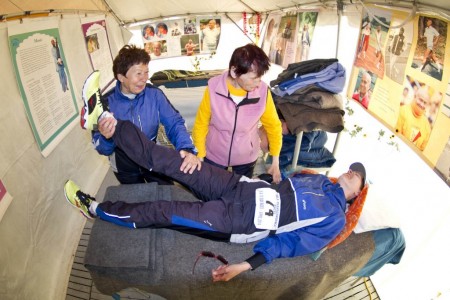
A runner being looked after in the medical tent
Musicians come, from time to time, to play their instruments or sing. Photographers visit with cameras, to provide a visual record of the event. Other visitors stop by just to cheer the runners on, or to watch their progress. ((To read more about the details of these races, search for either ‘6 and 10 day race’ or ‘Perfection Journey’. The former records the daily results for the runners, and the latter offers day-by-day insight into the race, along with photographs of and interviews with some of the runners.))
This is the physical set-up, but what I really want to describe is the level of happiness that pervades the entire race area. As I approached the village one day last week, it seemed to me that feelings of peace and joy were radiating out to the park at large. You might imagine that the runners, each of whom has run at least one marathon a day for the last several days, might be groaning and miserable. Not at all! They look cheerful, smiling at the visitors, offering thanks to the cooks, the musicians, the counters. If they had been stressed and disappointed the first time they took part, they would never have come back, but many of them have returned to this race year after year, some for over ten years. Similarly, the cooks, who are doing things like stirring pasta in pots large enough to serve over 100 people, look as if they are enjoying themselves; and their food tastes good, a sure measure of the cook’s state of mind, in my opinion. The counters are sitting in one place, for four or five hours in a row, their attention firmly focused on their runners, anxious not to miss a single lap, but they too are smiling and energized, shouting praise and encouragement to their runners, and they, too, return year after year. The personal assistants, unlike some of the runners, will never record a “personal best” at this event, but when their runner stays up half the night, they do too, and they say they like it; sometimes when their runner is sleeping, they volunteer to help the counters, the cleaners or the electricians.
Sri Chinmoy, the author of Jewels of Happiness, a meditation Teacher who was also a master athlete, often spoke about running as a metaphor for the spiritual life. I myself am not an athlete, I am a retired professor and researcher. But after counting at this event several times in the last two weeks, I am more than ever convinced that to dedicate ourselves to self-transcendence in any aspect of our lives is one of the surest ways to find happiness.
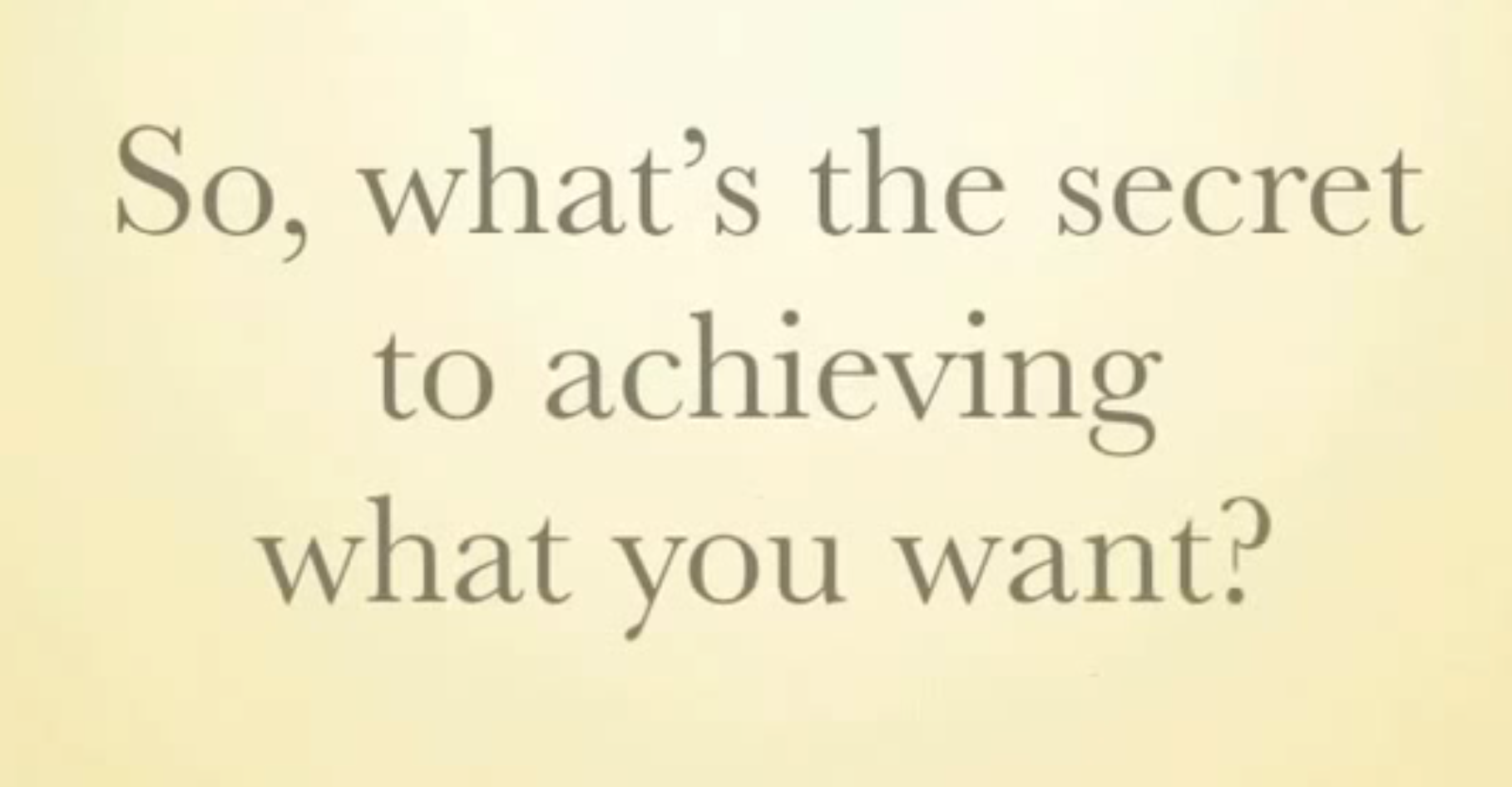
Aspiration and Self-Belief: some inspiring videos
We found a couple of very nice videos about believing in yourself, and daring to dream – we hope you enjoy them!

Some inspiring videos on happiness research
Here are some very popular videos that have been making the rounds lately from SoulPancake which are quite fun, and also quite moving.
An experiment in Gratitude:
Happiness and success:
Also (while we’re talking about things that have inspired us recently – here is a link to an ESPN article about how the Seattle Seahawks American football team are using visualisation and meditation techniques as part of their training: http://espn.go.com/nfl/story/_/id/9581925/seattle-seahawks-use-unusual-techniques-practice-espn-magazine )

10 Secrets of Happiness
1. Start Within…….
It’s a cliché but honestly, happiness really does come from within. Not from anything external, or from acquiring any material possessions, status, or relationships.
So start WITHIN to find your own happiness. You can begin with prayer, contemplation, listening to peaceful music, finding inner stillness to create balance and harmony in your life.
2. Visualise your day
Early in the morning, first thing, take precious time for yourself – to set up your own day. Take 5 minutes every day to visualise only good things happening in your thoughts and in your actions that day. Every day we create our own world, and thus our true sense of happiness.
3. Be Healthy……
Your body is a temple and your soul is the shrine inside it. Happiness is then the fragrance emanating from within. Use dynamic exercise and healthy nutritional diet to keep the body a beautiful, fit and shining temple, in great working order.
4. Compassion and Kindness……
Practice kindness. Acts of self-giving become more frequent in your day-to-day life’s activities. Karma Yoga is a branch of Yoga which is spirituality in action. Through self-offering your heart widens, the ego diminishes and your sense of oneness expands.
5. Gratitude……
Gratitude is your secret strength. It is one of the most important spiritual qualities to cultivate, to increase your own feeling of lasting happiness. In The Jewels of Happiness Sri Chinmoy gives the following aphorism:
“You want to know
How to express your gratitude?
It is quite easy.
Just smile your soulful smile.
Your soulful smile
Embodies gratitude
In its purest fragrance.”
6. Simplicity……
Simplicity is a secret to bring happiness that comes through having less. Happiness means the simplicity of life. Try to feel that all you have is the simple simplicity of a child, and you will be able to stay happy and make progress faster.
7. Heart, Not Mind…..
Be determined to feel your life’s direction, rather than using the calculating mind to try and plan and change it. Listen to your heart’s wisdom, through the silence and stillness within you. Use your heart to guide you in life. Stop to smell the roses, you will feel happy.
8. Have a Sense of Humour…..
Try not to be so hard on yourself and others, and not to judge with the critical mind. Endeavour to have a light touch in your interactions. We are all characters in a play. Like actors, we all have a role to play and go about our parts in life with a smile in our hearts and a sense of humour. Try to feel detached from so called failures and think of them from a higher view point, until you can laugh at them and learn for the future.
9. Try Meditation…….
One day you may realise that in your search for happiness, you begin asking the big questions in life: Why am I here? What is the meaning of life? What is my Soul’s Purpose or Mission? When you are sincerely willing to try and gain happiness through change and making inner progress, you may discover the art of meditation. By calming and stilling the mind, you find yourself momentarily suspended above and beyond the world of everyday events and mundane thoughts. Create a place of Light and stillness inside your spiritual heart every day – where happiness and true inner joy can grow and expand. Test out meditation for yourself in your own life, and see the happy place it leads you to.
10. Smile!!
Need I say more? Smile at people you love, smile at people you like, smile at people you don’t like, smile at workmates, smile at strangers. Spend your life smiling at others and not only do you personally begin to feel happier, but you are creating a self-giving act that multiplies and expands throughout the universe, of love, peace and understanding. Smile! ☺

50 Random Acts of Kindness in 50 Days
On April 13th 1964, 50 years ago, The Jewels of Happiness author Sri Chinmoy felt an inner compulsion or calling to move from his native India over to New York to be of service to people who were sincerely seeking happiness and a more fulfilling life through practising the art of meditation and self-discovery.
In New Zealand and Australia (as well as all over the world), we have felt inspired to honour this momentous achievement with numerous humble offerings of our own. One of the projects we are presently embarking on is 50 acts of random kindness over 50 days leading up to April 13th (we began on Feb 23rd). This was initially meant to be offered by 50 people but I think we ended up having around 35 perhaps.
Personally, doing a project like this has helped make me more aware of little actions in every day life where I can be conscious of being kind, helpful, thoughtful and present in every moment. Each action is not huge or difficult, but by ensuring I do one (or most days – two) of these random acts of kindness, I feel I am creating a more self-giving spirit in myself. It is also rewarding sometimes to see how even a random smile to a stranger can make all the difference to both of your days.
When I came up with the idea for this project I initially felt a tiny bit daunted, wondering if it would be possible in my busy life to do one every single day for almost 2 months, but so far, so good. It really is just the little moments in your daily life that you can remember to use to be of service. Of course Sri Chinmoy was constantly of service to humanity in so many ways, including Lecture tours around the world, to speak of Peace; Concerts for Peace in many countries; Offering his art, music and other creative endeavours to the world; and helping everyone with the sincere wish to learn to meditate and further their own spiritual growth.
Some acts of kindness…
But, although minor in significance, I would like to share with you here just a few of the Kindness Acts I have offered in the past 2 weeks – to demonstrate just how easy it is to accomplish a project such as this, if you keep it in your heart through the day…
Probably my favourite deed was buying bunches of flowers for my boss and delivering them to her house waiting for when she got out of hospital that day after minor surgery. Several occasions I also cooked dinner for my workmates when I knew this would help them in a busy evening of theirs.
Interactions with strangers are more common than you may think: helping an old man in the supermarket; pushing someone else’s child on the swing in a park when their parent was busy; holding the gate open for another runner approaching on a farm track.
Plenty of opportunities arise in busy traffic to allow your kindness to come forward instead of annoyance or impatience: letting a car in where others aren’t; allowing space for a car when they are in the wrong lane etc.
Sometimes you don’t have opportunities with strangers every day – so I like to then help my neighbours: getting in their rubbish bins for them, bringing mail from our shared letterbox up to their door for them; giving neighbours working in garden in the sun slices of watermelon to eat; moving obstructions off neighbours driveways for clear access.
In The Jewels of Happiness, Sri Chinmoy says
“If somebody asks you for your kindness,
Do you know what you give
To that person actually?
You give him
Your extraordinary love-power.”
In cafes and shops around Auckland, you can find aphorism cards with similar writings by Sri Chinmoy, given away free – to inspire. Here are two of them I found which seem appropriate for this project of self-offering:
“A happiness-flower-heart
Is always found
In a self-offering life.”
“What are the essential
Necessities of spirituality?
Love and serve.”
I do hope sharing this little project I have been working on at the moment, alongside others, will inspire you to perhaps look about with eyes wide open for those random moments when you can offer your heart’s love and kindness to the world around you. It is truly bringing me great happiness and joy in my own life.
So feel free to begin this very day and join in if you feel inspired! It is fun to keep a record, journal or blog of experiences you may have had each day.

